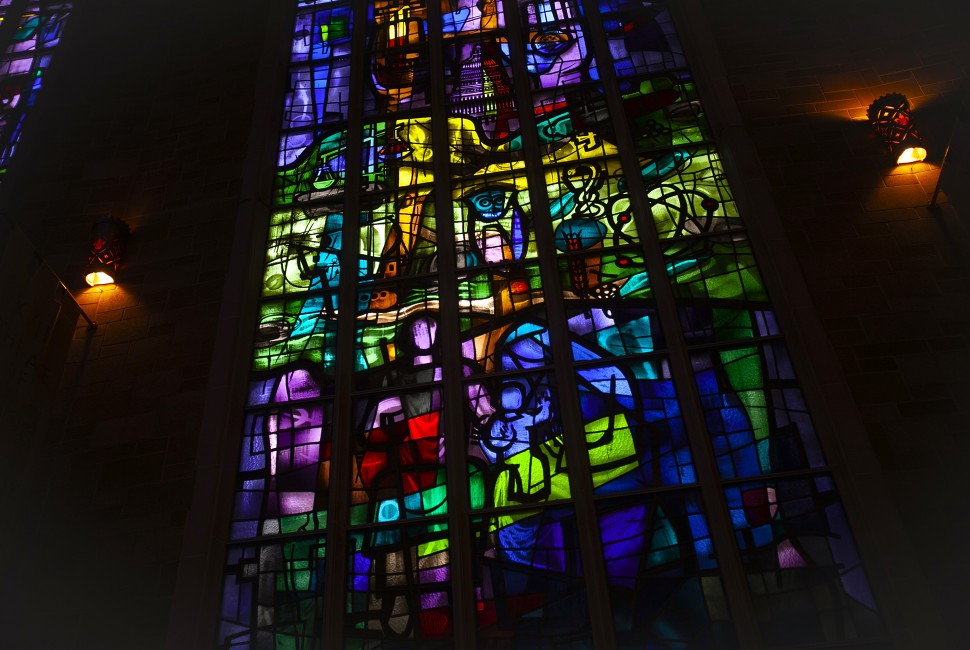It’s a fact that members of the LGBTQ+ community attend church all over the world. Queer people often hold leadership positions in the pulpit and in the choir. But for Black congregations and gospel music specifically, influence by the queer community is stronger and more common than one might realize.
“The choir in the Black church has always been a place where gay men could show off their virtuosity while exploring their sexuality,” said E. Patrick Johnson, dean of the School of Communication.
Reflecting on his time growing up in a southern Baptist church in Hickory, North Carolina, Johnson identifies himself as a “church sissy.” He often points out that he sang in the soprano section of the choir because of his high vocal range as a child.
“For me and so many others like me, the church was a place where we could safely express our queerness in covert ways while taking pleasure in pushing the limits of gender,” Johnson said.
For National Coming Out Day, a day established in 1988 by a psychologist and feminist as a form of gay liberation, Johnson is teaming with longtime friend and Northwestern colleague, Kent R. Brooks, director of special projects for the department of religious and spiritual life, to lead a special lecture and performance called “Gays and Gospel” on Tuesday, Oct. 11, at Alice Millar Chapel on the Evanston campus.
The free event explores the tensions, challenges and triumphs of the LGBTQ+ community in gospel music. It also traces the origins of the gospel music genre in Chicago and explores how gospel greats like Walter and Edwin Hawkins, Mahalia Jackson, Albertina Walker, Shirley Caesar and other recording artists, including Aretha Franklin, were influenced by and collaborated with the queer community.
Johnson and Brooks talked to Northwestern Now recently about the event and why it is important to highlight this often overlooked part of gay history.
Are most people surprised to learn about the history of gays in gospel?
Johnson: Gays in gospel music is kind of an “open secret.” However, I think it might be surprising for some to learn who some of those folks were. James Cleveland is a prime example. He wasn’t a stereotypical effeminate man at all. He had a very low raspy voice. But, he was in fact gay — although he wasn’t open about it.
Who are some of the other queer performers you will talk about in the lecture who influenced gospel music?
Johnson: One of the people who some might not associate with gospel is the great disco queen Sylvester. Sylvester was part of the Walter Hawkins and the Love Center Choir. He was one of the people who sang in falsetto. He got his start in gospel music. Even though Sylvester is mostly known for disco, when you listen to some of his music, you can definitely tell he grew up in the church. The gospel is there.
Brooks: There were also house parties. For instance, the Reverend C.L. Franklin, Aretha Franklin’s father, would host parties, and we’ve learned through recent films about Aretha’s life that there were lots of shenanigans going on there. James Cleveland was one of the people who was often sourced in C.L. Franklin’s obituaries, and people knew he was gay. There are many people in this lecture from those early days in the ’30s, ’40s and ’50s who were not what we consider “out.” But they were “open secrets.”
The LBGTQ+ community is often condemned from the pulpit. How do queer people stay active in the church?
Brooks: The Black church has one of the original “don’t ask, don’t tell” scenarios for queer people in congregations. We often see the trope of the middle-aged “Uncle Donnie” sitting on the organ or directing the choir who hasn’t been married. It’s more than “he just hasn’t found the right woman yet.” More times than not, the church knows why he is single. But yet, he is so talented, and they need his gifts and talents. The fact that he can make people dance and shout is celebrated, but not in his whole self.
Johnson: Indeed many people go through a phase where it is difficult to reconcile their spirituality with their sexuality. That’s a long process for many people. For some, us included, it’s an ongoing process. It’s not unusual to have people still singing in the church who are still struggling, and it’s not uncommon to have people who are very famous now, who are still struggling.
Will there be singing during “Gays and Gospel?”
Johnson: There will be lots of music. You can’t talk about gospel music without performing gospel music. Kent will be playing the piano and joining me from time to time in song.
Brooks: And for the first time, we are including students from the Bienen School of Music in the performance. We want people to leave Millar Chapel humming and clapping.


